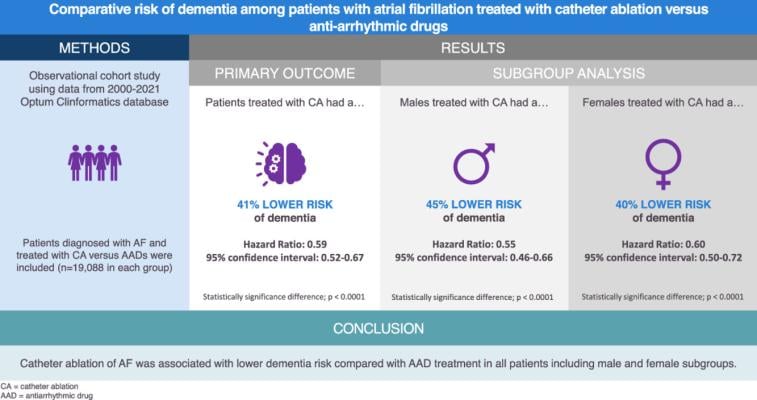
November 10, 2022 — Biosense Webster, Inc., the global leader in cardiac arrhythmia treatment and part of Johnson & Johnson MedTechi, announced today that data from a Biosense Webster-sponsored study that compares the risk of dementia in patients with atrial fibrillation (AFib) who were treated with catheter ablation (CA) versus anti-arrhythmic drugs (AAD) was published in the American Heart Journal. The study evaluated non-specific catheter claims information and found that CA was associated with significantly lower risk of dementia compared to treatment with AAD only1.
AFib is the most common type of cardiac arrhythmia and impacts nearly 40 million people worldwide2, and 6 million people in the U.S. alone3. Cases of AFib are expected to increase to 16 million by 20504 in the U.S. AFib is associated with significant cardiovascular comorbidity, including multiple forms of brain injury such as stroke, cognitive impairment and dementia5,6. Dementia, in particular, presents a profound burden with more than 10.5 million Americans predicted to be affected by 20507. Historically, dementia in patients with AFib was attributed to multiple strokes; however, studies have shown that AFib is associated with multiple forms of dementia, even in the absence of stroke8.
“Atrial fibrillation and dementia independently are a growing concern with the aging of our population. Through this study we sought to better understand the complex relationship between AFib and dementia by exploring how treatment type for AFib plays a role in the development of dementia, and how clinicians might reduce this risk,” said Emily P. Zeitler, MD, MHS, assistant professor of medicine, Geisel School of Medicine, Dartmouth. “Catheter ablation, as a course of AFib treatment, may reduce this risk.”ii
AFib suppression, or “rhythm control,” often becomes the treatment goal following an AFib diagnosis. This is often attempted first with AAD. For those eligible, catheter ablation is associated with greater reduction in AFib burden, improved quality of life, and reduced mortality and cardiovascular hospitalizations9,10,11.
According to the study, AFib patients treated with catheter ablation had a 41% lower risk of dementia compared with those treated with anti-arrhythmic drugs (1.9% vs 3.3%; hazard ratio [HR] 0.59, 95% confidence interval [CI] 0.52-0.67)12. Reduced risk of dementia was observed among both male and female subgroups. The reduction in the risk for dementia associated with catheter ablation versus AAD for the subgroup of female patients was 40%; in males it was 45%13.
“Research like this supports the hypothesis that AFib suppression may reduce the risk of developing dementia,” said Jamie March, head of health economics and market access, Cardiovascular Specialty Solutions Group, Biosense Webster, Inc. “That understanding underscores the importance of innovations like catheter ablation to the large and growing AFib patient population.”
For more information: www.getsmartaboutafib.com
References:
i Johnson & Johnson MedTech comprises the surgery, orthopedics, vision and interventional solutions businesses within Johnson & Johnson’s MedTech segment.
ii Biosense Webster, Inc. entered into an Authorship agreement with Dr. Zeitler. She has not been compensated.
- Zeitler, Emily P., Bunch, Jared T., et al. Comparative risk of dementia among patients with atrial fibrillation treated with catheter ablation versus anti-arrhythmic drugs. American Heart Journal. September 2022.
- Lippi G, Sanchis-Gomar F, Cervellin G. Global epidemiology of atrial fibrillation: An increasing epidemic and public health challenge. Int J Stroke. 2021 Feb;16(2):217-221. doi: 10.1177/1747493019897870. Epub 2020 Jan 19. Erratum in: Int J Stroke. 2020 Jan 28;:1747493020905964. PMID: 31955707.
- Mody BP, Raza A, Jacobson J, Iwai S, Frenkel D, Rojas R, Aronow WS. Ablation of long-standing persistent atrial fibrillation. Ann Transl Med. 2017 Aug;5(15):305. doi: 10.21037/atm.2017.05.21. PMID: 28856145; PMCID: PMC5555980.
- Miyasaka Y, Barnes ME, Gersh BJ, Cha SS, Bailey KR, Abhayaratna WP, Seward JB, Tsang TS. Secular trends in incidence of atrial fibrillation in Olmsted County, Minnesota, 1980 to 2000, and implications on the projections for future prevalence. Circulation. 2006; 114:119–125. doi: 10.1161/CIRCULATIONAHA.105.595140.
- Koh YH, Lew LZW, Franke KB, Elliott AD, Lau DH, Thiyagarajah A, Linz D, Arstall M, Tully PJ, Baune BT, Munawar DA and Mahajan R. Predictive role of atrial fibrillation in cognitive decline: a systematic review and meta-analysis of 2.8 million individuals. EP Europace. 2022.
- Diener HC, Hart RG, Koudstaal PJ, Lane DA and Lip GYH. Atrial Fibrillation and Cognitive Function: JACC Review Topic of the Week. Journal of the American College of Cardiology. 2019;73:612-619.
- G. B. D. Dementia Forecasting Collaborators. Estimation of the global prevalence of dementia in 2019 and forecasted prevalence in 2050: an analysis for the Global Burden of Disease Study 2019. Lancet Public Health. 2022;7:e105-e125.
- Saglietto A, Matta M, Gaita F, Jacobs V, Bunch TJ and Anselmino M. Stroke-independent contribution of atrial fibrillation to dementia: a meta-analysis. Open Heart. 2019;6:e000984.
- Asad ZUA, Yousif A, Khan MS, Al-Khatib SM and Stavrakis S. Catheter Ablation Versus Medical Therapy for Atrial Fibrillation: A Systematic Review and Meta-Analysis of Randomized Controlled Trials. Circ Arrhythm Electrophysiol. 2019;12:e007414.
- Mark DB, Anstrom KJ, Sheng S, Piccini JP, Baloch KN, Monahan KH, Daniels MR, Bahnson TD, Poole JE, Rosenberg Y, Lee KL, Packer DL and Investigators C. Effect of Catheter Ablation vs Medical Therapy on Quality of Life Among Patients With Atrial Fibrillation: The CABANA Randomized Clinical Trial. JAMA. 2019;321:1275-1285.
- Marrouche NF, Kheirkhahan M and Brachmann J. Catheter Ablation for Atrial Fibrillation with Heart Failure. The New England journal of medicine. 2018;379:492.
- Zeitler, Emily P., Bunch, Jared T., et al.Comparative risk of dementia among patients with atrial fibrillation treated with catheter ablation versus anti-arrhythmic drugs. American Heart Journal. September 2022.
- Zeitler, Emily P., Bunch, Jared T., et al.Comparative risk of dementia among patients with atrial fibrillation treated with catheter ablation versus anti-arrhythmic drugs. American Heart Journal. September 2022.


 January 05, 2026
January 05, 2026 









